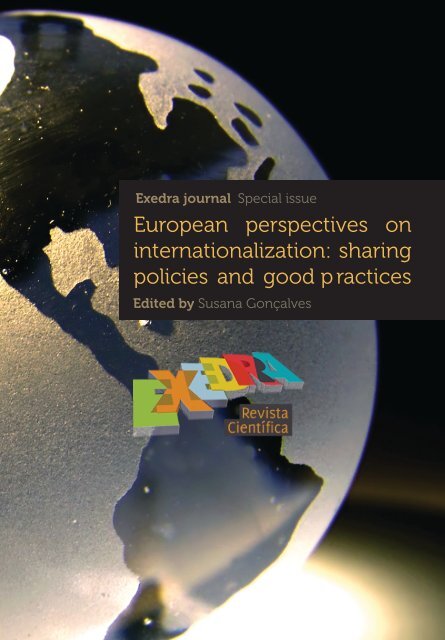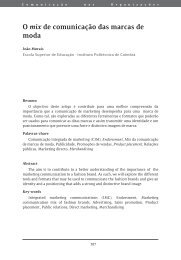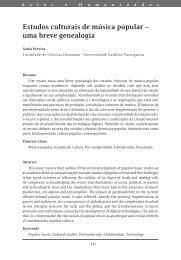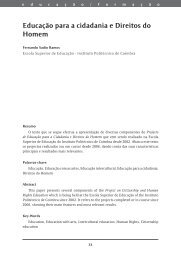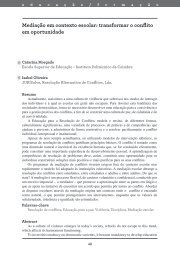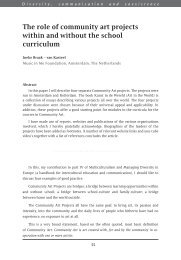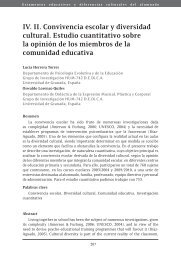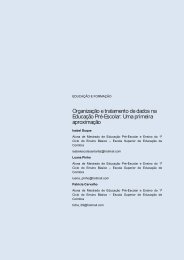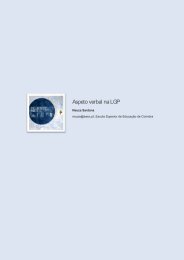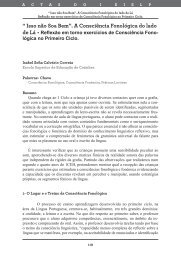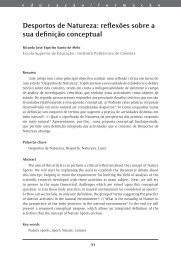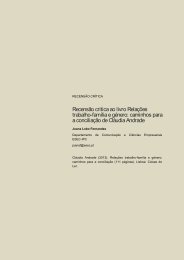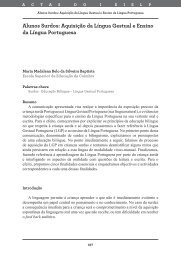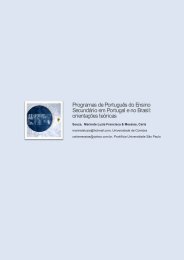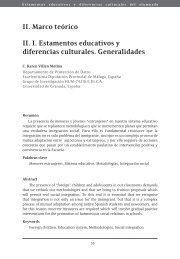European perspectives on internationalization: sharing ... - Exedra
European perspectives on internationalization: sharing ... - Exedra
European perspectives on internationalization: sharing ... - Exedra
- No tags were found...
You also want an ePaper? Increase the reach of your titles
YUMPU automatically turns print PDFs into web optimized ePapers that Google loves.
Editorial BoardDirectorAna Maria Sarmento CoelhoSpecial issue editorSusana G<strong>on</strong>çalvesScientific CouncilPedro Balaus Custódio - Educati<strong>on</strong>Maria Cláudia Perdigão Andrade - Communicati<strong>on</strong> and Management SciencesFrancisco Rúbio - Art & HumanitiesEditorial CommiteeJosé Pacheco (CIC/NDSIM)Margarida Paiva Oliveira (CDI)Carla Matos Dias (CDI)Producti<strong>on</strong><strong>on</strong>line Editi<strong>on</strong> - José Pacheco (CIC/NDSIM)- Carla Matos Dias (CDI)logo - Agostinho Franklim Carvalho/Pedro Coutinhographic project - Agostinho Franklim Carvalho/José PachecoEXEDRA: Revista CientíficaElectr<strong>on</strong>ic publicati<strong>on</strong> of the Politechnic Institute of Coimbra (Instituto Politécnico de Coimbra) /College of Educati<strong>on</strong> (Escola Superior de Educação)Periodicity: SemestralISSN 1646-9526 printed versi<strong>on</strong>ISBN 978-989-96927-1-8Depósito LegalCopyrightWritten permissi<strong>on</strong> is needed for any reproducti<strong>on</strong> of material published in this Journal.Address for corresp<strong>on</strong>denceEXEDRA: Revista CientíficaEscola Superior de Educação de CoimbraPraça Heróis do Ultramar3000-329 Coimbra - PortugalTel: +351 239793120 - Fax: +351 239 401461exedra@esec.pt | www.exedrajournal.com
<strong>Exedra</strong> journal Special issue<str<strong>on</strong>g>European</str<strong>on</strong>g> <str<strong>on</strong>g>perspectives</str<strong>on</strong>g> <strong>on</strong>internati<strong>on</strong>alizati<strong>on</strong>: <strong>sharing</strong>policies and good practicesEdited by Susana G<strong>on</strong>çalves
07EditorialSusana G<strong>on</strong>çalves - Special Issue coordinatorINTERNATIONAL EDUCATION AND NETWORKING13-2829-3839-4849-7071-7879-8485-96The imperative for internati<strong>on</strong>al educati<strong>on</strong>Susana G<strong>on</strong>çalvesPan-<str<strong>on</strong>g>European</str<strong>on</strong>g> training and networking for educati<strong>on</strong> professi<strong>on</strong>als: the PestalozziProgramme of the Council of EuropeJosef HuberChildren’s identity and citizenship in Europe: an Erasmus academic network projectPeter CunninghamPractical networking as an internati<strong>on</strong>alisati<strong>on</strong> tool: a case study of the BusinetOrganisati<strong>on</strong>David TaylorInternati<strong>on</strong>alisati<strong>on</strong>: an agent of change and development (the case of EAIE)Bjørn Einar / Gudrun PaulsdottirETEN: an european network open to the worldJosé Portela / Alice Hindsgavl / Astrid Scho<strong>on</strong>acker / Danny Wyfells /George Bieger / Helle SchousboeLearning mobility between Europe and India: a new face of internati<strong>on</strong>alcooperati<strong>on</strong>Solom<strong>on</strong> Arulraj DavidINTERNATIONAL CURRICULUM DEVELOPMENT99-126127-132From ESPIEW to NESPIEW: a witness about a curriculum development project lifetimeMarcel DesaegherThe Project To-Gather: good practice in real life learningWim Kratsborn
<str<strong>on</strong>g>European</str<strong>on</strong>g> <str<strong>on</strong>g>perspectives</str<strong>on</strong>g> <strong>on</strong> internati<strong>on</strong>alizati<strong>on</strong> <strong>sharing</strong> policies and good practiceseditorialThe ancient Greeks and Romans used the <strong>Exedra</strong> (a semi circular portico/ room oroutdoor area with seats) for holding philosophical c<strong>on</strong>versati<strong>on</strong>s and tertulias, whatthe Portuguese call the friendly open minded discussi<strong>on</strong>s, while savouring coffee orwine. This journal takes its name from this inspirati<strong>on</strong>al c<strong>on</strong>cept of <strong>sharing</strong> ideas andvisi<strong>on</strong> for a better understanding of the intriguing phenomen<strong>on</strong> of life, peoples and theworld. With this special issue of the <strong>Exedra</strong> Journal, a more cosmopolitan debate hasbeen started into this publicati<strong>on</strong>, a virtual exedra, by gathering authors from variouscountries, professi<strong>on</strong>al expertise, fields of interest and acti<strong>on</strong>. The publicati<strong>on</strong> of thisspecial issue has great instituti<strong>on</strong>al meaning. It signals and celebrates the quick evoluti<strong>on</strong>of internati<strong>on</strong>alizati<strong>on</strong> at ESEC – in <strong>on</strong>ly a decade, it has succeeded in becoming a widelyrecognized school for the vivacity of its internati<strong>on</strong>al acti<strong>on</strong>s.I feel privileged and h<strong>on</strong>oured to be the coordinator and editor of this special <strong>Exedra</strong>issue. This journal is <strong>on</strong>ly in its infancy yet, this being its fifth editi<strong>on</strong> since launch <strong>on</strong>eyear ago. It is a free access <strong>on</strong>line publicati<strong>on</strong> targeted at every<strong>on</strong>e interested in HigherEducati<strong>on</strong>, Pedagogy and Applied Sciences. The announcement and invitati<strong>on</strong> for aninternati<strong>on</strong>al issue was extremely well received by scholars, researchers and academics allover Europe. I envisage this remarkable adherence to the project (18 articles c<strong>on</strong>tributesby 31 authors) as a sign of c<strong>on</strong>fidence in the quality of our publicati<strong>on</strong> and trust in ourability to disseminate valuable ideas, projects, strategies and joint ventures presented ineach of the selected articles.I also see this as an incentive to go <strong>on</strong> promoting internati<strong>on</strong>alizati<strong>on</strong> and its virtues.Internati<strong>on</strong>alizati<strong>on</strong> is inescapable for modern day universities, evolving from the blindmechanism of globalizati<strong>on</strong>. Some might say that it brings risks, uncertainty, competiti<strong>on</strong>and unidentified dangers for instituti<strong>on</strong>s, faculty and students. Perhaps. However, it canalso coincide with a great many set of opportunities; <strong>on</strong>e of the most interesting, inmy view, being the growing cosmopolitism and the reducti<strong>on</strong> of barriers, borders andimpediments for us to learn from each other and to collaboratively pursuit the projectof building a better and more sustainable society. Sharing scientific advancements,interrogati<strong>on</strong>s, intriguing data and results, negotiating decisi<strong>on</strong>s and adhering to jointprojects are all powerful vehicles to walk al<strong>on</strong>g this pathway.This volume is a modest yet valuable part of the project. It is the result of a challengemade some m<strong>on</strong>ths ago to several <str<strong>on</strong>g>European</str<strong>on</strong>g> colleagues who are actively committedto internati<strong>on</strong>alizati<strong>on</strong> and who are in some way involved in internati<strong>on</strong>al activities.The goal was to collect examples of policies and practices, organizati<strong>on</strong>s and networks,7
exedra • special issue • 2010projects and strategies that might signal good and effective practices in the field ofinternati<strong>on</strong>alizati<strong>on</strong> of higher educati<strong>on</strong> and R&D. It was also intended to disseminatesuch good practices, in its many facets and to propagate the examples of internati<strong>on</strong>alorganizati<strong>on</strong>s, such as academic networks and associati<strong>on</strong>s and higher educati<strong>on</strong>instituti<strong>on</strong>s in Europe.As a whole, the collected articles illustrate the energies and synergies that are beingused to create and shape the <str<strong>on</strong>g>European</str<strong>on</strong>g> space of educati<strong>on</strong>. They support the noti<strong>on</strong> ofa multi-dimensi<strong>on</strong>al internati<strong>on</strong>alizati<strong>on</strong> of higher educati<strong>on</strong>. These articles also giveevidence of a set of projects, programmes and practices that have been developed overthe years to face the demands of a cooperative / joint space of higher educati<strong>on</strong>. Thispublicati<strong>on</strong> thus portraits a clever and informed adaptati<strong>on</strong> of intellectuals, teachers,departments, instituti<strong>on</strong>s and transnati<strong>on</strong>al organizati<strong>on</strong>s to the aboliti<strong>on</strong> of borders,promoting the creati<strong>on</strong> and diffusi<strong>on</strong> of some of the most valuable goods of moderntimes: informati<strong>on</strong>, knowledge and educati<strong>on</strong>.The variety of c<strong>on</strong>cerns addressed by the authors illustrates how complex andmultifaceted the c<strong>on</strong>cept of ‘internati<strong>on</strong>alizati<strong>on</strong>’ is. This issue includes seventeenselected articles <strong>on</strong> the following topics:• Student and teacher mobility and internati<strong>on</strong>al Educati<strong>on</strong>• Internati<strong>on</strong>alizati<strong>on</strong> at home and Internati<strong>on</strong>al dimensi<strong>on</strong>s of the curriculum• EU and CoE programmes, such as Erasmus networks or the Pestalozzi Programme• R&D, internati<strong>on</strong>al cooperati<strong>on</strong> and networking (the example of Cice, Businet, ETEN)• Promoting intercultural educati<strong>on</strong> through internati<strong>on</strong>alizati<strong>on</strong>• Internati<strong>on</strong>al students’ recruitment and integrati<strong>on</strong>• Best practices in internati<strong>on</strong>alizati<strong>on</strong>The articles have been grouped in a structure of four parts: Internati<strong>on</strong>al educati<strong>on</strong>and networking, Internati<strong>on</strong>al curriculum development, Internati<strong>on</strong>al students andinternati<strong>on</strong>alizati<strong>on</strong> at home, and Eu policies and opportunities. Feedback from readersis very much welcome. Authors’ c<strong>on</strong>tacts can be obtained from susana@esec.pt. I wouldalso like to encourage further dialogue to c<strong>on</strong>tinue our efforts and promote a resp<strong>on</strong>sibleand valuable internati<strong>on</strong>alizati<strong>on</strong>.I am immensely grateful to each author for the trust deposited in this project and forchoosing <strong>Exedra</strong> as a means to share their expertise and to spread their ideas, work, andresearch/development projects. I also want to thank the <strong>Exedra</strong> Director and EditorialBoard, Margarida Paiva and the staff at ESEC/NDSIM for the cooperati<strong>on</strong>, guidanceand resp<strong>on</strong>siveness. This was essential to reaching our goals and make this task moremanageable.8
<str<strong>on</strong>g>European</str<strong>on</strong>g> <str<strong>on</strong>g>perspectives</str<strong>on</strong>g> <strong>on</strong> internati<strong>on</strong>alizati<strong>on</strong> <strong>sharing</strong> policies and good practicesLast, but not least, I would like to acknowledge and express my deep gratitude to thePortuguese Fundação para a Ciências e Tecnologia (FCT – the Portuguese governmentbody resp<strong>on</strong>sible for financing and evaluating the nati<strong>on</strong>al scientific and technologicalsystem), for the financial support given to the publicati<strong>on</strong> of the printed versi<strong>on</strong> of thisissue, so increasing the visibility and access to this publicati<strong>on</strong>.Susana G<strong>on</strong>çalves,Editor of the <strong>Exedra</strong> Journal Special Issue‘<str<strong>on</strong>g>European</str<strong>on</strong>g> <str<strong>on</strong>g>perspectives</str<strong>on</strong>g> <strong>on</strong> internati<strong>on</strong>alizati<strong>on</strong>: <strong>sharing</strong> policies and good practices’College of Educati<strong>on</strong> (ESEC) - Polytechnic Institute of Coimbra, Portugal9


